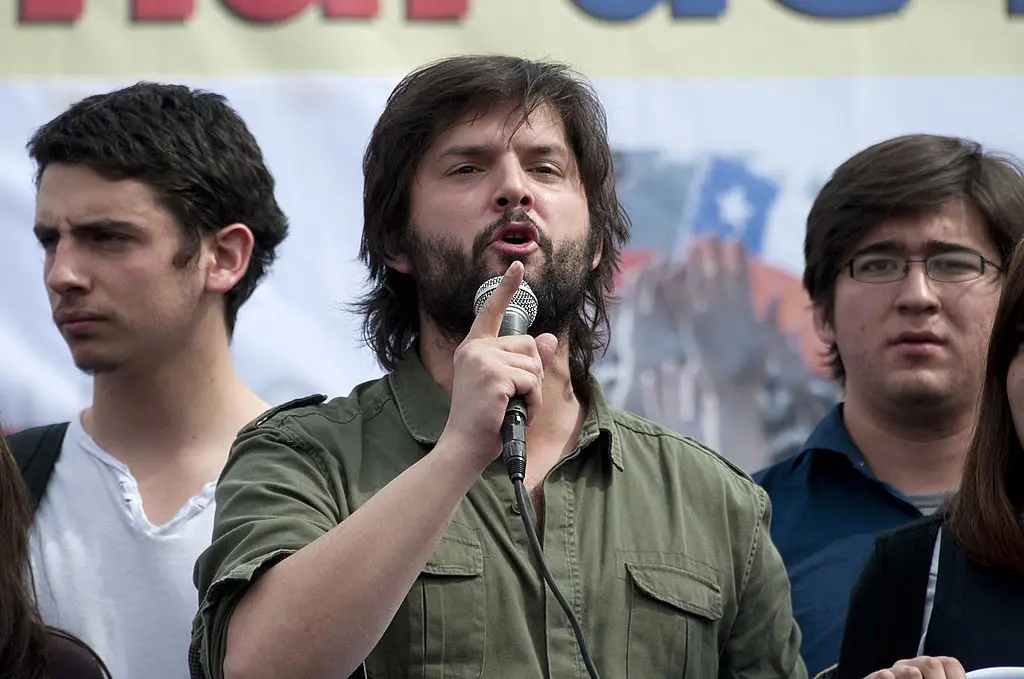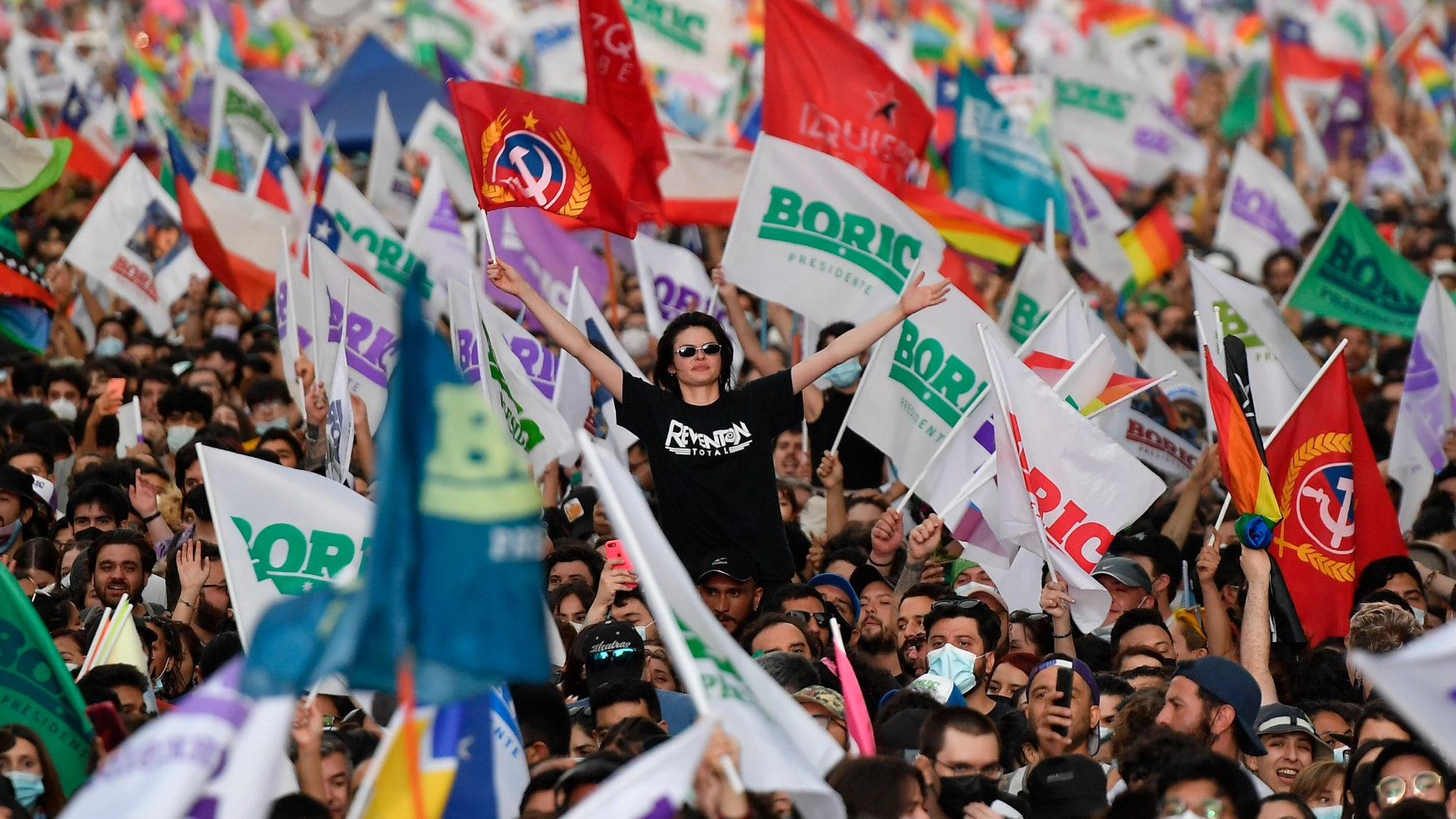In a sweeping rejection of Pinochetism, the people of Chile chose liberal candidate Gabriel Boric over his far-right opponent José Antonio Kast in the country’s hotly contested December 19th runoff election. Boric, who took 56% of the popular vote, rose to prominence as a representative of student activists during protests that began in 2011 amidst the rising cost of higher education in a declining Chilean job market. Earlier this year, Boric organized an electoral coalition of the country’s left-wing parties called “Apruebo Dignidad” (Approve Dignity). Encompassing a broad spectrum of left-wing movements, Boric’s coalition was successful in uniting Chile’s left and ultimately forged his path to victory.
Apruebo Dignidad represents a new frontier in Chile’s ongoing efforts to erase the dominant legacy of Pinochetism that has ruled the country since the mid-1970s. Comprised of, among others, the Broad Front — which Boric helped launch in 2017 — as well as the Communist Party of Chile and Boric’s own Social Convergence party, the coalition has successfully mounted a response to its emerging far-right opponents and the social unrest protests that began in 2019. Additionally, Boric’s support of a new constitution drafted by Chile’s Constitutional Convention and his repeated campaign trail promises to end Chilean neoliberalism, a core tenet of Pinochet’s rule, both serve as tangible steps towards liberation of the Chilean people.

Student leader Gabriel Boric delivers a speech during a protest to demand Chilean President Sebastian Pinera’s government to improve public education quality in Santiago, on August 28, 2012. Photography courtesy of Claudio Santana/AFP Getty Images.
However, Boric has even more on his plate than his ambitious first term agenda might suggest. Given that Apruebo Dignidad encompasses such a large swath of Chile’s liberal and leftist spectrum, the runoff election was editorialized as a battle between two opposing extremes. It even garnered international attention as part of a pattern of recent elections that demonstrated the ever-intensifying divisiveness between conservative populism and promises of social and economic reform from what many characterized as the far left.
In reality, Boric was, and continues to be, a much more moderate candidate than Kast, who’s been quoted advocating for the preservation of Chile’s “European heritage” while running a campaign defined by populist talking points and numerous comparisons to both Donald Trump and Brazilian president Jair Bolsonaro. Kast is also the son of a Nazi who fled to Chile after World War II. There probably aren’t any skeletons as large in Boric’s closet, but there is work to be done if he has any chance of maintaining solidarity within Apruebo Dignidad throughout his upcoming first term.
Despite some more firmly lefitst positions like his recent labeling of Israel as a “genocidial and murderous state”, Boric has resisted fully aligning himself with the Communist Party of Chile, repeatedly criticizing Cuba and Venezuala of human rights abuses in stark opposition to the CPC’s platform. Insofar as Boric refuses to define a consistent platform within Apruebo Dignidad’s spectrum of the left, he’ll open himself up to opposition narratives that could create a path to victory for Kast, or any populist candidate for that matter, in 2026. The coalition is committed to representing the next generation of Chileans, sometimes to the point of pandering, as is the case with their web page of candidates inspired by the “Who’s that Pokemon?” design. Boric runs the risk of alienating himself within his own party if he doesn’t concede at least some of his agenda to Aprueba Dignidad’s emerging factions.

Supporters of Chile’s President elect Gabriel Boric, of the “I approve Dignity” coalition, celebrate his victory in the presidential run-off election, in Santiago, Chile, Sunday, Dec. 19, 2021. Photography courtesy of Matias Delacroix/AP Photo.
There’s also the matter of Chile’s Constitutional Convention, which is in the process of having its 155 elected constituents, 28 of which come from Apruebo Dignidad, draft a new Chilean constitution. The president-elect attended a convention meeting on Dec. 21 and, in an official statement, made clear he plans to take a hands-off approach to the proceedings. An article from “Republic World” quotes Boric as saying, “I have no doubt that they will act with wisdom, in the best sense and thinking of the best for all Chileans. I am not going to try to guide the convention regarding what it has to do, but rather respect and implement what is deliberately decided.” A majority of 104 votes is needed to ratify a new constitution, but of the convention’s 155 constituents, neoliberal coalition Chile Vamos was awarded 37 seats while another 36 seats were awarded to center and center-left coalitions Lista del Apruebo and Non-Neutral Independents.
Though Boric’s aspirations to be “president of all Chileans,” as he put it in his acceptance speech this week, are admirable, the opening statements of Boric’s presidency have been decidedly undecided. To those hoping for something that even resembled radical change, Boric’s immediate and repeated appeals to bipartisanship were probably a disheartening defense of the status quo he promised to disrupt. “The future of Chile needs us all,” he said in his speech, adding, in reference to the opposition “I hope that we have the maturity to listen to your ideas.” The fact remains that his victory represents a crucial move away from the destructive neoliberalism that has all but decimated Chile’s working class economy, social safety net and education system.
What Boric does with his first term will, for better or worse, end up defining the next decade of Chilean politics, but the hope is that his continued victories as a student protester and representative of the Chilean people will translate to success and productivity in office. At 35-years-old, Gabriel Boric may just be leading Chile into the future it deserves. Viva Chile!










